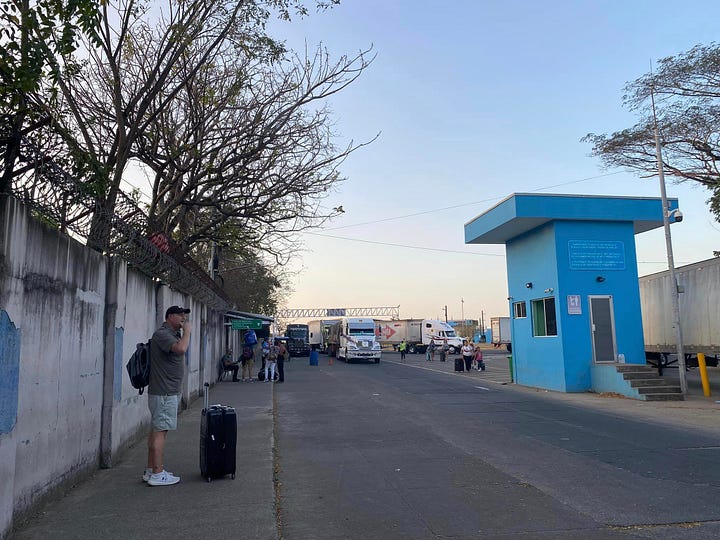Nomadic Life with a Non-Nomad Partner
How do you reconcile travel and nomad life, even part-time, when you're in a committed relationship?
Maintaining a relationship while living as a digital nomad and having a partner tied to a full-time, non-remote job is no easy feat. (Maintaining a relationship with yours truly is work enough, I suspect, so it’s a trade-off!)
You might have met while already on your nomadic journey, or maybe one of you decided to embrace the nomad life after being together for a while. It hasn’t been straightforward for us either, but we’re figuring it out.
I’ve been fully remote in my work for about 20 years, save for a few on-site contracts. I’m also a mom and didn’t want to be away more than a week or two for work while they were young.
There came a point, though, where my partner Trevor and I had to have some difficult conversations and make a joint decision. We lost everything in 2017 after being defrauded in a bad business deal. Trevor received a great job offer in our hometown.
It was the perfect next step for him, but the complete opposite of what I thought our next steps would look like.
And so we compromised.
We agreed he would take the job, and I would be semi-nomadic… a part-time nomad sort of arrangement.
It’s not perfect, believe me. There are still a ton of challenges we work through on a regular basis.


We’ve had arguments when I’ve booked travel and didn’t get the high-five I wanted from him, for example.
I’m really excited! I’m going to this cool place; I’m going to see my writer and online business friends. Can’t you just be happy for me?
Meanwhile, he’s stomping around the house like a storm cloud for days. I would avoid bringing it up again until we begrudgingly had to talk logistics.
After we cycled through this a few too many times over a period of years, I finally pushed the issue.
“Why are you trying to ruin my plans?” (An unfair statement, I know, but there it is.) “We had an agreement! You knew I wasn’t going to stay here for the next ten years working out of a spare bedroom!”
And finally, that opened up a crack we could both see the issue through clearly.
“I don’t want you to be unhappy,” he said. “But don’t you think I want to go, too?”
With that, I realized my delivery each time I planned a new trip truly sucked.
I wasn’t thinking at all about making him feel left out or left behind. Of course he wants to come with… that’s our plan for later, once he retires.
And yes, he can be happy for me. But I need to give him time and space to process and adjust.
Maintaining two separate households or frequently traveling to see each other can also be a financial burden, with the costs of flights, accommodations, and other travel-related expenses quickly adding up.
I’m a travel deal-shopper by necessity, and we try to plan around avoiding peak travel times when prices spike. We can often find cheaper flights by using less popular airports, flying on separate one-way tickets and changing airlines to stay with domestic lines, and traveling at odd hours.
For example, there’s a Spirit flight that comes over to Managua from Miami and lands around 1am…
UPDATE: It’s a daytime flight now!
I swear, this was the reddest of red-eyes last time he took this route. Thank the goddesses they’ve updated the schedule to reasonable hours.
Anyway, you can often find great deals if you travel light and are willing to kill some time in an airport. We would grab something like this, for example, to get him from Toronto to FLL:
I will warn you that using these super discount carriers and switching airlines means you risk losing your ticket if you miss a flight. That’s the gamble. These tickets are rock-bottom rates and non-refundable.
Another word of caution… since I first published this post, much has changed. If you’re no longer willing to travel through the U.S. for deals, you’re not alone.
I’m comfortable rolling the dice for a flight under $275 CDN / $200 USD on a route like this with multiple options for rebooking the same or next day.
Even if we miss the second leg at some point and have to buy a new ticket (knock on wood, hasn’t happened yet), it’s a lot less in the long run than paying full rate for return flights on the same carrier every time we want to see each other.
Recommended reading: When The World’s on Fire, You Don’t Have to Go Quiet. Wanting More Is Still Allowed.
On top of compromise, you need a solid layer of trust.
For those times you are apart, maintaining trust and emotional intimacy when you’re not physically together has to be a priority, and this takes real effort on both sides.
If you don’t trust your partner, there’s no way spending weeks or months apart with each of you living a whole, fulfilling life outside your shared experience is going to work out.
You’re going to need to make time for each other often despite differing schedules and challenging time zones.
When you spend a lot of time apart, you’re missing out on a lot of shared experiences, and they’re essential for keeping a strong bond and relationship.



I love getting a call when something is happening in his life. I talk to Trevor nearly every day, sometimes several times, to share the experiences I’m having.
If that isn’t something you’re comfortable with or enjoy doing – if you feel it’s intrusive to get spontaneous calls, or can’t make time for regular check-ins – you’ll struggle in a sometimes-long-distance relationship.
Celebrating milestones, attending events, and simply spending time together are all activities that become challenging to coordinate, too. Especially when you’re trying to save money on flights and coordinate around two work schedules.
I’ve missed celebrations I wish I’d been home for, so we make a Plan B. Maybe Christmas happens two weeks early. Maybe birthday dinners are a little late.
Due to the physical distance, both partners might feel lonely or isolated. The nomadic partner might miss the comfort of having their significant other around, while the partner at home might feel left out of the nomadic adventures. Balancing these dynamics requires a deep commitment to each other and a lot of patience.
Are you ready to make joint decisions about the future? Decisions about where to live, long-term financial planning, and significant life events demand clear communication and a willingness to compromise.
Life gets a lot more intentional when you’re in a relationship that doesn’t follow the traditional pattern of “go on dates > get married > buy house > have children > work and save, taking a one to two-week vacation each year until you’re 65 > enjoy retirement.”
It’s a lot, right?
I don’t want to sound preachy because we’re not doing this whole semi-nomadic relationship thing perfectly. But in the dozen years or so we’ve been together, we’ve learned a few things.
Remember that life is short and most of the stuff we tend to worry about really doesn’t matter much at all.



There’s a lot of upside to living differently and having an unconventional marriage, too. It’s nice to be missed, for starters. The time we do get to spend together is more precious, and we don’t want to waste it bickering over petty stuff. We have some pretty amazing adventures, and yet still have our own space, interests, and lives.
If you want to make a relationship work, you will – whether you spend all of your physical time in a shared place or not.
Life is unpredictable, but open communication, mutual respect, and a bit of creativity can go a long way. It's not about having a perfect arrangement; it's about finding what works for you both and rolling with the punches. So, keep talking, keep compromising, and most importantly, keep enjoying the ride.
You might also like:











